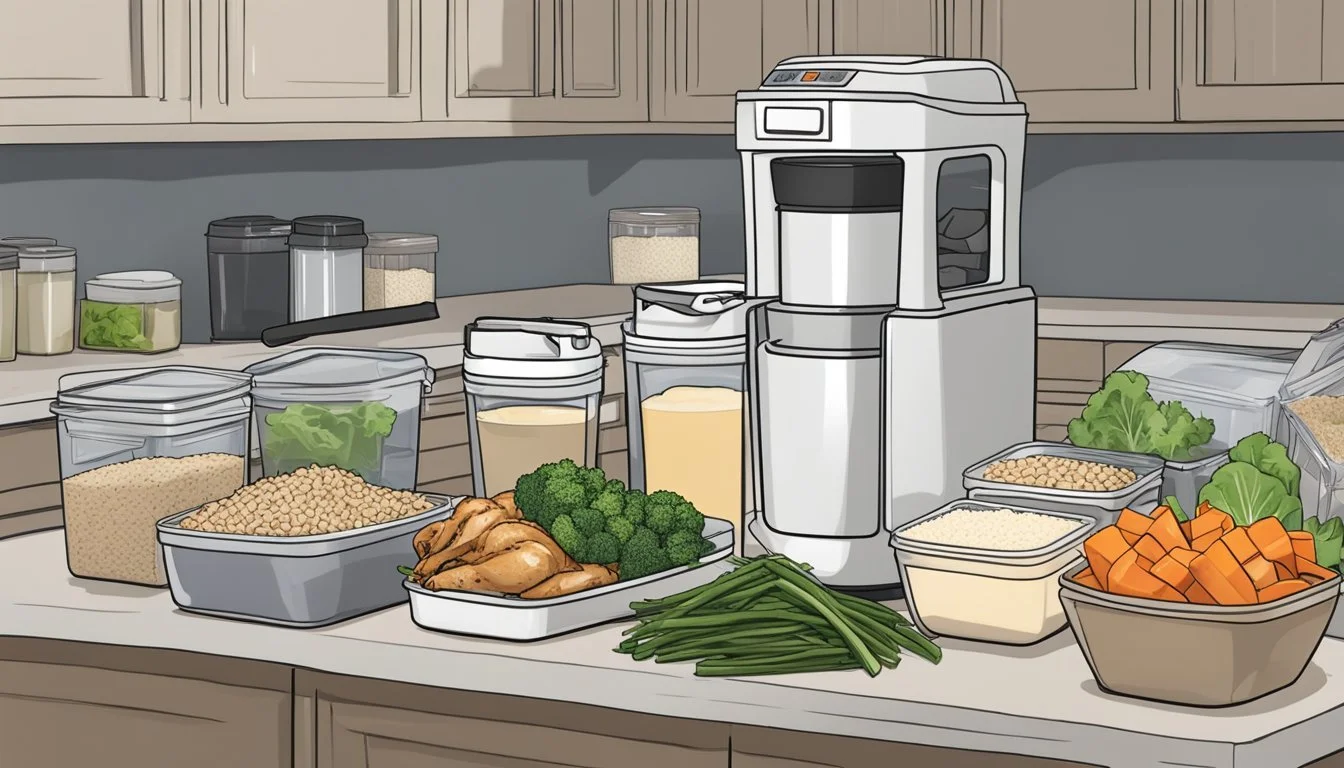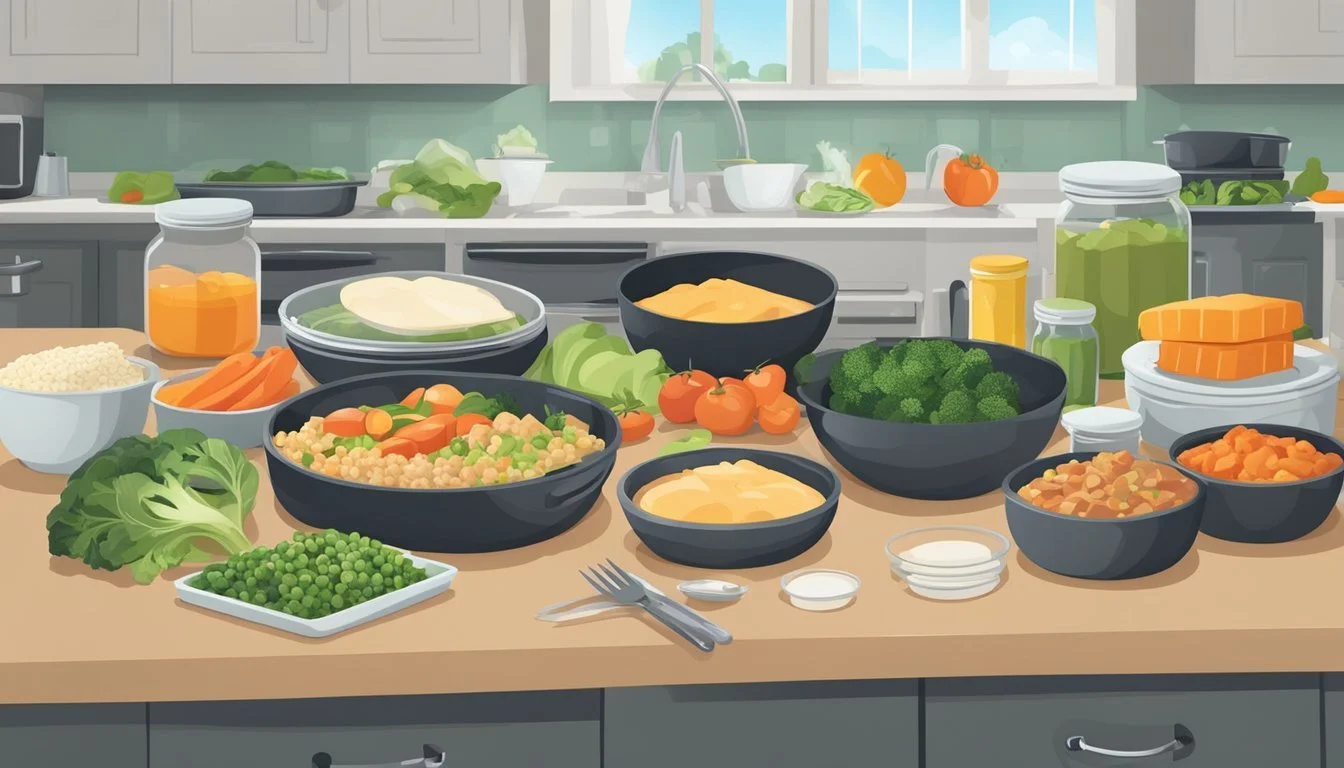Meal Prepping for Powerlifters
Unleash Strength with Nutrient-Packed Recipes
Powerlifters know that building strength is not just about routine workouts, but also about fueling the body appropriately. The practice of meal prepping ensures that they have the right nutrients available at all times to support muscle growth, recovery, and optimal performance. Essential elements such as protein, carbohydrates, and fats need to be carefully balanced in meal preps to cater to the high-energy demands of powerlifters and their rigorous training schedules.
Meal prepping offers a practical solution to maintaining a diet that aligns with strength-building goals. With recipes specifically designed for powerlifters, meal preps can be both nutritious and varied to avoid dietary monotony. These recipes often incorporate high-protein ingredients, dense in calories, to aid in muscle repair and growth, alongside complex carbohydrates that provide sustained energy for heavy lifting sessions.
Furthermore, by adopting meal prepping, powerlifters can control portion sizes and meal timing more effectively, key factors in a diet for muscle mass increase and fat control. This structured approach to nutrition can help streamline their daily routines, leaving more time to focus on training and recovery, ultimately leading to better performance outcomes.
Understanding Powerlifting Nutrition
Powerlifting success hinges on a well-structured diet, where the right balance of macronutrients and micronutrients catalyzes strength gains and muscle growth.
Macronutrients for Muscle Strength
Macronutrients are the cornerstone of a powerlifter's diet, playing a pivotal role in muscle strength and hypertrophy. Protein is critical for muscle repair and growth, with an intake recommendation of 1.4-2 grams per kilogram of body weight. Powerlifters should choose lean proteins such as chicken, fish, and lean cuts of beef, which provide essential amino acids without excessive fat.
Carbohydrates are the primary source of energy, fueling workouts and replenishing glycogen stores. Healthy carbs like whole grains and vegetables should constitute 5-8 grams per kilogram of body weight. Complex carbohydrates have a lower glycemic index and are preferred for sustained energy release.
Fats should not be neglected, as they account for about 30% of the total caloric intake, supporting metabolism and hormonal functions. Sources of healthy fats include avocados, nuts, and seeds, which contribute to overall health while supporting the energy demands of rigorous training.
The Role of Micronutrients in Powerlifting
Micronutrients, though required in smaller quantities, are vital for powerlifters. Vitamins and minerals support numerous physiological processes including muscle contractions, bone health, and immune function. A diverse diet rich in fruits, vegetables, and lean proteins generally provides sufficient micronutrients, but some athletes may require supplementation to address any deficiencies.
Energy and Metabolism in Strength Training
A powerlifter's metabolism is directly influenced by their caloric intake and the macronutrient composition of their diet. The intake of calories must align with energy expenditure to optimize performance and recovery. Excess calories can lead to fat gain, while a deficit may hinder muscle growth and strength development.
Monitoring the timing of nutrient intake can enhance performance; for instance, consuming a blend of carbohydrates and proteins post-training can boost recovery and muscle repair.
Balancing Calories for Performance and Recovery
Finding the right caloric balance is critical for powerlifters to either gain muscle or achieve fat loss while maintaining lean muscle mass. This balance depends on several factors including training intensity, frequency, and individual metabolic rate. Adjustments should be made based on regular assessments of body composition and performance outcomes.
In summary, a diet for powerlifting must include the correct balance of macronutrients for energy and muscle building, and micronutrients for overall health and bodily functions, all while maintaining a caloric intake that supports the athlete's strength training goals.
Meal Prepping Essentials
Meal prepping is an effective strategy for powerlifters to maintain a consistent, nutrient-rich diet that supports strength building and recovery. It involves cooking in bulk and portioning out balanced meals to save time and ensure dietary goals are met.
Planning Your Powerlifting Meals
The foundation of successful meal prep begins with a well-thought-out plan. Powerlifters should design meal plans that offer a balance of macronutrients, with an emphasis on protein for muscle repair and complex carbohydrates for energy. Including a variety of recipes prevents dietary monotony and ensures a wide range of nutrients are consumed.
Selecting Quality Ingredients
To maximize the benefits of meal prepping, choosing high-quality ingredients is crucial. Fresh, whole foods like lean meats, fruits, and vegetables offer superior nutritional value over processed foods. Powerlifters should incorporate foods high in essential amino acids, such as chicken breast (What wine goes well with chicken breast?) or protein powder, to further enhance muscle synthesis.
Efficient Cooking Techniques
One should utilize efficient cooking techniques to save time and preserve the nutrient integrity of foods. For proteins, methods like baking or grilling are excellent for preparing large batches without adding excess fat. Steaming vegetables retains their nutrition and texture better than boiling.
Storing and Reheating for Freshness
How meals are stored and reheated can impact food quality and safety. Meal prep containers should be airtight to keep food fresh and prevent spoilage. Reheating should be done evenly, and only once, to maintain the taste and minimize the risk of foodborne illnesses.
Grocery Shopping Tips for Success
Effective grocery shopping is pivotal in maintaining a budget while sourcing diverse and nutritious ingredients. Powerlifters should craft a focused and flexible grocery list based on their weekly meal plans. Purchasing in bulk and opting for seasonal produce can lead to cost savings.
Budget-Friendly Powerlifting Meals
Creating budget-friendly meals doesn't mean compromising on quality. Powerlifters can purchase whole foods in bulk, like rice or oats, and pair them with budget proteins like eggs or canned tuna. Batch cooking recipes with these ingredients saves money and provides the needed nutrients without breaking the bank.
Strength-Building Recipes for Powerlifters
Crafting meals suitable for a powerlifter involves focusing on a diet rich in proteins, carbohydrates, and healthy fats. Each meal is an opportunity to feed the muscles, support recovery, and enhance performance. Here are recipe ideas designed to meet these needs throughout the day.
High-Protein Breakfast Options
Egg White Omelet: Use 4-5 egg whites, mix in diced sweet potatoes (What wine goes well with sweet potatoes?), and a cup of spinach for an iron-rich start to the day. Season with pepper and a pinch of salt.
Protein Oatmeal: Stir a scoop of your favorite protein powder into a bowl of cooked oats. Top with banana slices for an energizing, high-protein breakfast.
Energizing Lunch Ideas for Muscle Recovery
Chicken Rice Bowl: Combine grilled chicken breast, half a cup of brown rice, and mixed vegetables such as broccoli, peas, and carrots. Drizzle with olive oil for healthy fats.
Beef and Sweet Potato Hash: Cube sweet potatoes and sauté with ground beef. Incorporate peppers and onions and season with salsa for a flavorful, nutrient-packed lunch.
Nutrient-Rich Dinners to Promote Growth
Salmon with Quinoa: (What wine goes well with quinoa?) Serve a grilled salmon fillet over a bed of quinoa. Include a side of steamed vegetables like asparagus to optimize muscle recovery and growth.
Pork Tenderloin (What wine goes well with pork tenderloin?) with Roasted Vegetables: (What wine goes well with roasted vegetables?) Roast a lean pork tenderloin seasoned with herbs. Pair it with a side of roasted carrots and parsnips for a satisfying dinner.
Snacks and Sides for Continuous Energy
Cottage Cheese with Pineapple: For a rich source of casein protein, combine cottage cheese with pineapple chunks. Ideal for a snack that provides sustained energy.
Peanut Butter Banana Smoothie: Blend together a banana, a spoonful of peanut butter, and almond milk for a protein-rich snack perfect for hunger pangs between meals.
Pre- and Post-Workout Recovery Meals
Post-Workout Protein Shake: Mix whey protein with water or almond milk and a small serving of quick-digesting carbs, like half a cup of cooked oats, right after your workout.
Pre-Workout Vegan Wrap: For those pre-workout energy boosts, fill a whole grain wrap with chickpeas, avocado, iron-rich leafy greens, and a splash of lemon juice.
Customizing Your Diet for Ultimate Performance
Customizing a diet is essential for a powerlifter's performance, recovery, and meeting fitness goals, whether in bulking, cutting, or maintaining phases. It involves precise adjustments of macronutrients and thoughtful inclusion of healthy food selections, especially when addressing specific dietary choices like veganism.
Adjusting Macros for Bulking and Cutting Phases
When a powerlifter is in a bulking phase, the goal is to gain weight and muscle mass. Macronutrients should be adjusted accordingly:
Carbohydrates: 2-3 grams per pound of body weight per day to fuel workouts and recovery.
Protein: Approximately 1 gram per pound of body weight per day to support muscle growth.
Fats: Around 0.4 to 0.7 grams per pound of body weight per day to maintain hormonal balance and overall health.
In contrast, during a cutting phase, the aim is to lose weight while preserving muscle. This requires a slight decrease in caloric intake, primarily from carbohydrates and fats, while keeping protein intake high to aid muscle retention.
Strategies for Vegan Powerlifters
Vegan powerlifters need to ensure their diet is balanced and nutrient-dense:
Protein: Sources like lentils, chickpeas, tempeh, and quinoa are vital.
B12 and Iron: These are critical nutrients that vegan powerlifters should monitor and consider supplementing.
Meal planning should revolve around these nutrient-rich sources to maintain energy levels and aid in muscle recovery.
Overcoming Plateaus with Diet Variations
Altering macronutrient ratios or introducing new foods can help break through performance plateaus. A way to approach this can be rotating carbohydrate sources or increasing healthy fats slightly for additional energy. This encourages the body to adapt and can lead to improved performance and recovery.
Supplementation for Enhanced Results
Supplementation can complement a powerlifter's diet:
Creatine: Improves strength and power output.
Whey or Plant-Based Protein: Convenient for meeting high protein requirements, especially post-workout for muscle recovery.
BCAAs: Can support endurance and reduce fatigue during intense workout sessions.
Powerlifters should remember that supplements are to enhance an already well-structured diet, not to replace whole foods.



